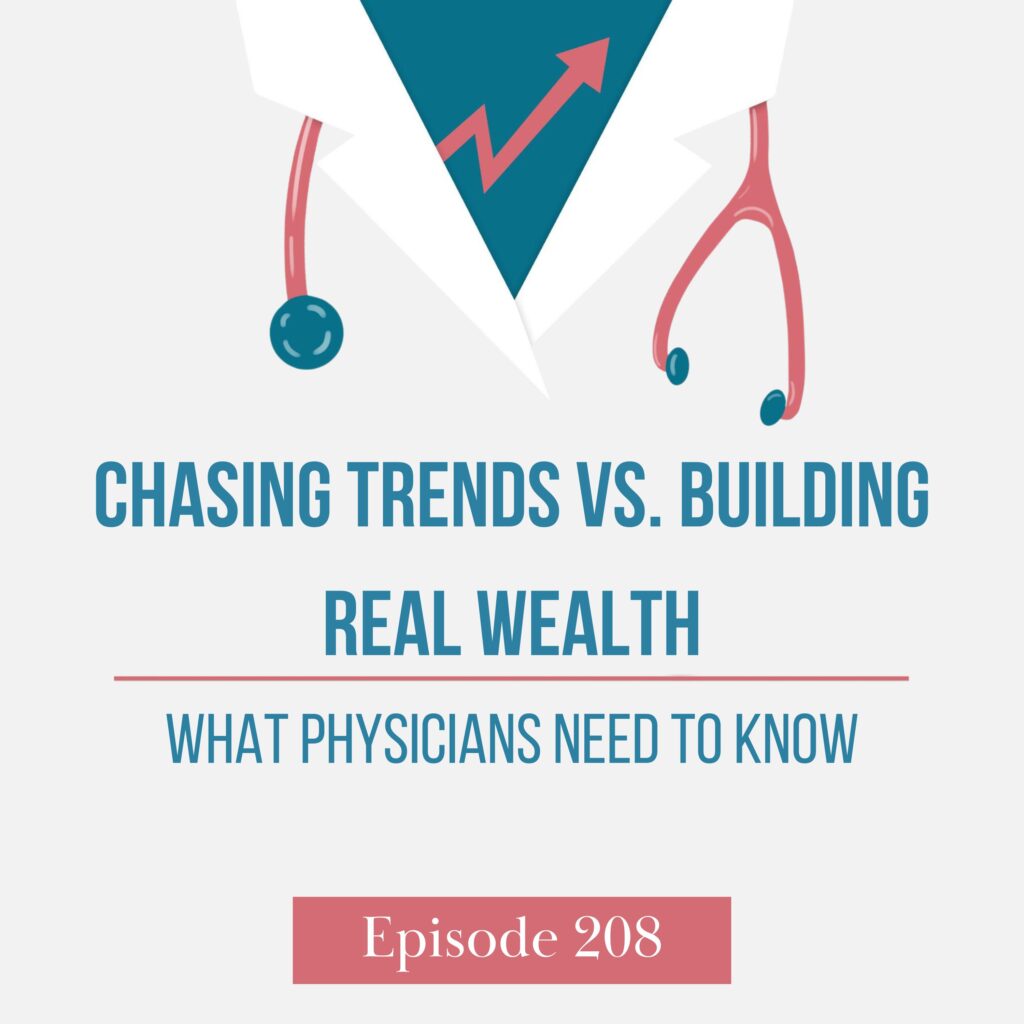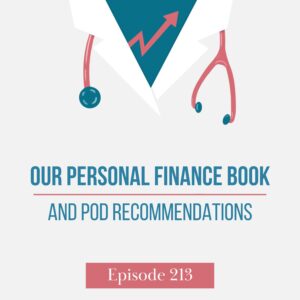Everywhere you look, someone’s promising passive income.
Real estate syndications, crypto, private deals — they all sound like the fast track to financial freedom.
But what if the real wealth builders are the “boring” investments you already have access to?
In this episode, Daniel Wrenne and Hugh Baker break down the difference between chasing trends and building true, lasting wealth.
They reveal why Target Date Funds often outperform “shiny object” investments and why most so-called passive income isn’t passive at all.
You’ll hear real stories of physicians who’ve been lured by hype, what they learned the hard way, and how you can invest without turning your portfolio into a part-time job.
—————————————————————————————————————————
Transform your financial outlook today! Access our exclusive free resources for physicians and conquer financial stress. Access here. P.S. We value your opinion! Share your thoughts and insights with us. Your feedback helps us improve and tailor our content to your needs. Click here to give us a piece of your mind.
Links
- VTTSX-Vanguard Target Retirement 2060 Fund
- Connect with Hugh Baker
- Connect with me on my LinkedIn
- Contact Finance for Physicians
- Finance for Physicians
- To schedule a call with one of our awesome planners, book HERE.
Full Episode Transcript:
Daniel Wrenne: The word passive is a very frustrating word to see from my standpoint because especially for the ones I know are not passive, because passive implies mailbox money, sit on your couch, and send them money, and then get a check. And a lot of ’em I know good and well there and completely not passive.
And then they market it as passive income, and that’s just wrong. I mean, it’s just incorrect. It’s a lie at the end of the day.
Welcome to Finance for Physicians, the show where we help physicians like you use money as a tool to live a great life. I’m your host, Daniel Wrenne, and I’ve spent the last decade advising physicians on their personal finances with the mission to help them understand that taking control of their finances now means creating a future where they can practice medicine where, when, and how long they want to.
Daniel Wrenne: Hugh, how’s it going, man?
Hugh Baker: Great, Daniel, how are you doing?
Daniel Wrenne: It’s going good. We hadn’t gotten on for a bit, so I’m excited to catch back up and talk a little shop.
We were just chatting before we hit record about this fantastic investment opportunity that we’ve known about for quite a while, but we were looking at the numbers for it, and I guess admiring how solid it looks, right?
Hugh Baker: Yeah. So what if I told you that there was a passive investment that returned $75,020 for every $100,000 that you invested five years ago? Does that peak your interest?
Daniel Wrenne: Do those numbers again. That’s…?
Hugh Baker: $75,020 for every $100,000 that you invested five years ago.
Daniel Wrenne: So that’s a 75% return, right?
Hugh Baker: Yeah. Over five years. Yeah.
Daniel Wrenne: Yeah. That’s pretty good.
Hugh Baker: Sound good?
Daniel Wrenne: Yeah. What’s that annually? 10% or 8%?
Hugh Baker: We’ll link to that in the show notes, but it’s 11-point-something.
Daniel Wrenne: Good. We will just say good.
Hugh Baker: Yeah. Good, good. The other cool part about it, it could be tax-deferred. It could be tax-free depending on how you do the investment.
Daniel Wrenne: This is a very passive investment, like you were saying.
Truly passive. When he said passive, he meant like no work required. Buy. Hold. You’re not getting your hands dirty.
Hugh Baker: Yeah.
Daniel Wrenne: I think, is that what you meant by passive? There’s also another passive, as in it owns the entire market, but I assume you’re meaning…
Hugh Baker: Right. So you don’t have to take out a loan. The minimum investment is only a thousand bucks. You can withdraw your money in a few days’ notice.
Daniel Wrenne: Yeah. Super liquid.
Hugh Baker: In fact, it’s so proven to work, right? You know how regulated the investment industry is, right? It’s very hard. We have a lot of regulatory oversight, and it’s so proven that even your employer is allowed to automatically take part of your paycheck and put it into this investment if you don’t make any choices for yourself.
So that last hint probably gave it away. Yeah. What we’re talking about here is the Vanguard 2060 Target Date Fund. So not sexy. It’s pretty boring, but if you just look at the numbers, 75,000 bucks roughly over the last five years for every $100,000 you invested? Not too bad.
Daniel Wrenne: Yeah, we’re getting above 10% a year.
It’s gotta be above 10% a year if we annualize it. But getting 10-plus percent per year is actually pretty challenging over longer periods of time. Say it’s pretty uncommon. It’s interesting, even the investments we see that have required a lot of effort. Oftentimes are not doing that or the investments you would think would be doing that or not doing that.
So comparatively, that’s a pretty solid return. Now it’s not. So we’re gonna be talking about all the alternatives out there, but I think the question is like. Why wouldn’t everybody put all their money in that? And a lot of people are putting their money into that because that’s what’s happening automatically through your work retirement plans.
Like Vanguard Target Retirement Date Fund or whatever Target Retirement Date Fund is a lot of people’s options for their retirement plans. And that’s a good option, but there’s plenty of people putting a lot of money in different alternatives to that. And that’s what we’re gonna be talking about mainly today is the alternatives and the temptations, I guess you could say, or the shiny objects.
Hugh Baker: Yeah. Yeah. I want 75% a year. Five years—
Daniel Wrenne: Or a week.
Hugh Baker: Yeah. That would make everything better. All the problems would go away.
Daniel Wrenne: Right. But it’s also a question of what’s reasonable. So if you do the math on what—we do retirement projections as our job. So we get to see all these numbers a lot like you and I, so we get a little more exposure to it.
But like when you start to look at the long-term projections, the difference between 7% annually for the rest of your life versus 8% versus 9% versus 10% 15% or 20%. It’s like exponentially higher. If you’re getting 20% return every year and you’re saving the average savings rate, you’re gonna be uber loaded.
And nobody’s really doing that. It’s extremely rare. So I guess my point is that a lot of times, there’s this question of what do you actually need to return? And it’s not typically that high of a percentage. So a lot of these temptations and shiny objects we’re gonna kind of talk through.
You don’t actually even need to—like this Vanguard Target Retirement Date option can typically do the job pretty easily.
Hugh Baker: Right. And before we lose anybody, because we’ve been talking about target date funds, I know you want your money to work as hard as it possibly can for you because you do a tough job.
Sometimes it’s hard to see a way out, and you’re looking for extra money to work less, or you wanna retire early. Or if you just have other things that you want to spend your money on, so you want your money to grow for you without you having to put as much into the accounts themselves. But those extra returns beyond the benchmarks that we’ve already laid the groundwork for don’t come with a lot of extra work or a lot of extra risk, and sometimes both. So you don’t want to fall behind those benchmarks.
If you focus on the things that you can control and you get those types of levels that your return, you’re entitled to getting just by owning some of these investments that cost essentially nothing like Daniel was talking about, then you don’t have to worry about shooting yourself in the foot and having to work longer than you need to, or not being able to afford some of those things that are really important to you.
Daniel Wrenne: So you mentioned risk and time. So alternatives potentially costing you in the form of added risk and/or added time.
What do you mean by that?
Hugh Baker: Yeah. Let’s first maybe define some of these flashy trends or alternatives that we’re talking about. So that could be private real estate syndications or investment funds. It could be meme stocks, it could be crypto. What are some other examples that you can pick up, Daniel?
Daniel Wrenne: GameStop when it was hyped up by Reddit—and gold could be one—gold coins, gold, your buddy’s investment deal. ‘Cause they know your doctor and they’re like, “I’m looking for investors.” There’s a… did you say syndications and…?
Hugh Baker: Yeah.
Daniel Wrenne: Real estate. Yes. Especially if it’s on a whim.
So you’re not bad. We’re not trying to say these are bad in themselves, first of all. This is just examples.
Hugh Baker: And you might hear about them because they went through a period where they’ve done really well, where they did the 75% in a year, right? They don’t pop up outta nowhere.
People wouldn’t spread them if there wasn’t at least a good recent performance period to point to and say, “Hey, look how well this did.” These people behind them aren’t stupid. They’re going to put a ton of money in spreading that once they’ve gone through a good period of time, but there’s extra risk and extra time involved in these things.
Extra time. We could start with that. There’s a lot of these private types of deals like the private equity or private real estate we’ve talked about. There’s extra time in the sense to just do your own due diligence on these things, like what are they actually doing? Sometimes that’s a really hard conclusion to come to, whereas sometimes they don’t have the properties yet.
They’re like, I don’t know. Give me the money. I’ll find a deal.
Daniel Wrenne: We’re gonna figure it out after you send us the check.
Hugh Baker: Right. So that also leans leads into extra risk a little bit there. Odds are, if something just had an explosion of really good performance, there’s probably a lot of other people that see that.
They’re like, “Oh, I wanna get into that market.” So money comes rushing in, the market gets saturated. You’ve got a lot of people chasing returns, bidding up prices on things, and all of the extra time and the extra risk that you’re accepting there. You might not get the extra returns that you are going through all this extra hassle for, maybe your money’s locked up now for five to seven years in some of these things, and you can’t access the money.
So that’s another really important piece—just locking up your money, not being able to access it. Now if it’s like a retirement account, that’s another deal, right? You’re getting some type of tax advantage for leaving the money in the account. But for some of these other alternative deals where maybe it’s—we might refer to taxable accounts or non-qualified accounts, where typically you would have access to money if you’re just investing in the target date fund we were talking about. But if it’s locked up in one of these private deals, that might not be the case.
Daniel Wrenne: Yeah. And also I would point out a lot of times these flashy, shiny object trendy investments, a lot of times that’s where just straight up schemes originate.
I’m not gonna start a Ponzi scheme ever, but if I was a crook and wanted to start a Ponzi scheme, I’m not gonna label it as a boring passive investment, like I’m gonna make it super flashy. And so they blend in with some of the legitimate, the stuff, the examples we’ve pointed out so far are all—they’re not scams, they’re just flashy.
But typically within those flashy investments are sometimes just straight-up schemes, like just straight-up unethical scheme. So you gotta keep your eyes out for those, I guess that falls under risks, like added risk,s of those types of investments.
Hugh Baker: A lot of ’em, some of these private placements, right?
You have to be an accredited investor, so you’ve got maybe a certain net worth or a certain income to even qualify for these investments. So it’s almost are they.—I don’t know who “they” is—but the overlord regulating these things, are they saying, “I know there’s probably gonna be some scams and schemes in here.
Let’s only let the people that can afford to lose the money in.” I don’t know if that’s true, but maybe that’s a safeguard.
Daniel Wrenne: Yeah. No, I’d say interesting thought. One of my favorite examples in a real—this is more mainstream example of this kind of shiny object trend was in 2007 with real estate, like everyone and their mother was buying real estate property, typically like vacation homes, like multiple vacation homes, starting to rent ’em out.
It’s actually where a lot of legitimate businesses today got started that are successful today. But the problem then is like everyone was buying these real estate properties in like touristy spots to the point where at one point, they were doing—this is when TV was bigger, still, like cable or whatever—they were doing like TV commercials for like vacation properties that were coming up that you could purchase and it’d be like one outta every three professionals you talked to had their own second or third home. And so everybody can look back and see what happened in 2008 and ’09. Like there was a big real estate crash and a lot of people lost a lot of money in real estate. Nine times outta 10 people got outta real estate because of that.
Now the one outta 10 that stayed into it has done pretty well. But the point is, like the mom-and-pop, like if you’re just, you have to be careful with these things. Like nine out of 10 is not very good. If nine out of 10 are getting out because it’s been so painful, that’s a problem. Now, the one out of 10 were the people that were making it a busi—like it was their profession.
They were doing it exactly for a living, and even some of them got hosed, a lot of them went bankrupt. But the people I know that stayed in it through the long haul that are still in it today, like in real estate all the way back till that were started around then were all in on it.
Like it was their profession, their business, and they were really good at it.
Hugh Baker: Yeah, and that’s the point too, right? You can’t expect that from a boring index fund either. You can’t expect to put the money in and just to go straight up, sorry. As soon as you put the money in, you’re gonna experience some period of time where the money’s worth less than how much you’ve put in.
Could be the next day, could be a week from now, could be a year from now, but with your example, those people had a plan. They went into it treating it like a business. They weren’t going to run away at the first sign of trouble. They were ready for it. They had plans for it. They treated it like a business.
So yes, you have to do that. You can’t think it’s just some magical investment that you can try once, and it’s just gonna work perfectly. It has to be something that you believe in. You’re gonna put the effort in. And you have some reason to believe that if you stick with it over the long haul, it’s going to work.
AD BREAK
Daniel Wrenne: Let’s take a quick break to talk about our firm, Wrenne Financial Planning.
The goal of our podcast is to empower you to make better financial decisions, but sometimes the best financial decision you can make is to work with someone who understands your financial goals and has the expertise to keep you on track to reach them. That’s where Wrenne Financial Planning comes in. We are a full-service financial planning firm that works with over 400 physicians and their families across the country.
We charge a transparent monthly flat fee for our services and offer virtual meetings you can take from anywhere. Best of all, you’ll get to work with a team that specializes in working with physician families. So whether you’re starting out and wondering how you’ll balance your student loan payments and saving for a home, or you are established physician trying to figure out how to pay for your kids’ college and how much you need to save to reach financial freedom, we can help.
I’ll put a link in the show notes to schedule a no-obligation meeting with one of our certified financial planners. Wrenne Financial Planning, LLC is a registered investment advisor. For more information about our firm, please visit wrennefinancial.com. That’s W-R-E-N-N-E financial.com.
AD BREAK END
Daniel Wrenne: So we get to see people’s finances a lot, which is a fun job in some ways. So what do you think of new financial, like when we’re seeing people’s finances for the first time. How often are these kinds of investments, and we’ll say for established people, like people that are relatively established, like physicians that are relatively established, how common do you think these types of investments are some portion of the investments for the typical physician?
Hugh Baker: Maybe 1 in 4 already have it. Like we’re talking established clients, so maybe we could define that as five years out of practice. Somewhere in that range, but maybe half are going to ask about it at some point. Maybe even more than half.
So that is something that we have to talk with people about. I could tell you that there’s at least one real estate fund that I know of right now that is talking about going belly up. So these things don’t—real estate doesn’t always go up. Some of these funds can go to zero,
Daniel Wrenne: Right. Yeah. And in my experience, so I would agree it’s maybe a quarter, maybe half of new clients’ financial positions we’re seeing, or, not half of their total assets, but like half of the families we see have experience with these types of investments. The other interesting thing. I’m curious if you agree with this thought as well.
I would say majority—it’s probably safe to say maybe even like the vast majority of those investments are underperforming the plain Jane boring investment like the target retirement date fund. I mean, if you have a long stretch of time to look at, I would say that’s a pretty safe bet in my experience.
Would you agree?
Hugh Baker: Yeah, that’s probably true. The variability in these things is so wide at least from what I see.
Daniel Wrenne: Right. In fact, it’s pretty rare that I see—I can count on my hand, like the times that I see people that are like really knocking it out on these types of investments, it’s not that common even though we see ’em all the time.
Hugh Baker: Right. Or maybe not paying out the dividends that were originally thought going into it. Maybe some of those projections haven’t worked out. But yeah, I haven’t seen too many people that are so thrilled because they’re knocking it out of the park with these investments. Often, sometimes it’s hard to get a true read on what is this thing really like worth now today?
Like how is it doing? You’re really just relying on the investor relations and their quarterly email that they send out. Other than that, there’s not a whole lot of information or a way to figure out exactly what is your investment worth until it’s sold and you get money back.
Daniel Wrenne: Right. I mean it, and it depends on what—so if you’re investing in like a stock, like a hyped up stock that’s different.
You can see how it’s performing. But if you’re investing in somebody else’s deal, especially a private business, or you’re doing your own real estate deals, or you’re buying a vacation rental, it’s very difficult. Most people don’t run the numbers on their own investments. Like most people don’t know what the rate of return is on their real estate, for example.
And a lot of times, it’s hard to get concrete transparency from these types of deals. Maybe it’s ignorance. Maybe it’s just… who knows, but I’m talking about compared to a Vanguard Target Retirement Date Fund, they’re about as transparent as you get.
And it’s regulated too. You get these reports all the time. You can easily check the return at any point in time. It’s exactly how it’s doing. And that’s not so easy to get in the—we’ll call it the shiny object world of alternative investments— but there’s so many people—But despite all that we’re talking about, there’s tons of people that are investing in it.
Why do you think people are doing that? Why are so many people continuing to invest in these?
Hugh Baker: I think income, like when people do an investment, in the stock market, they can see the investment change, but I think what there’s something psychological to having money deposited, or at least a thought of money being deposited like a paycheck into your bank account.
Whether that’s dividends or rental income, right? Passive income.
Daniel Wrenne: Mailbox money.
Hugh Baker: Right. For some reason, people view that differently than their account growing even though you could click a few buttons and have it in your bank account, you’re just choosing to let it continue to compound. I think for at least a lot of our clientele.
A lot of the clients that I am talking to, they’re maybe in their thirties and forties, they have kids. They’ve got a lot going on, so they want to work less maybe or they at least want to be able to earn less in their day job because it’s stressful. They see a lot of people throughout the day. They got all these things to juggle, and that’s really appealing for them to think, “Oh, I don’t have to have this job if I can build up this side income to come in and replace that paycheck.”
I think that thought of that is very comforting to them. And maybe they don’t quite realize, or just don’t have the experience with dealing with it until they get into it with managing a rental property. And then maybe that’s only cash flowing, couple hundred bucks a month, right? And it’s oh man, this is lousy.
This is not what I thought it was going to be like. And now you have another thing to juggle unless you wanna hire somebody to deal with it, which is going to eat into your check anyway. So I think that’s why a lot of people get into it.
Daniel Wrenne: And the people that these are typically sold to, that’s not always, but one good test of these—
There’s who’s making money on it? So sometimes you can sniff these out by looking at where the—follow the money. And you can sometimes get a good idea of the motivation, but with these kind of deals, they’re often sold and they are very good at capitalizing or leveraging what you just talked about with, say you’re frustrated with work, and you feel overworked, and you want to have some freedom from your practice. You wanna have freedom for medicine, you want to have financial independence, and you want to have passive income. And we see those buzzwords all the time, especially with the ones that are really good.
They’ll throw in those buzzwords to catch the eyes of people that are struggling with those things. That’s the part I get most frustrated about. One of my most—I really get frustrated when these deals say it’s passive income. Like they say—the word “passive” is a very frustrating word to see from my standpoint because especially for the ones I know are not passive, because passive implies mailbox money, sit on your couch, and send them money, and then get a check.
And a lot of ‘em—I know good and there and completely not passive. And then they market it as like passive income, and that’s just wrong. I mean, it’s just incorrect. It’s a lie at the end of the day.
Hugh Baker: Which types of investments are you talking about in particular?
Daniel Wrenne: Real estate’s number one that uses that, I guess there’s potentially others, but real estate like is 99 times out of 100, all the ones I’m thinking of are real estate deals or gurus or whatever. Yeah. And they love the passive income.
Hugh Baker: Right. Maybe if they just lean into, hey, this is going to be some work to get set up initially. And then there’s also going to be some ongoing work, and sometimes there are going to be some very poorly timed maintenance things that you need to do, but in the end, if you go about it the right way, you’re going to make some money. Maybe that’s a better approach. Yeah. That’s not easy to sell.
Daniel Wrenne: Yeah, that’s why you gotta look at who’s making money or what the deal is.
One of the biggest reasons people get into these is that they’ve heard it’s a good idea, right? Most people aren’t finding these kinds of deals. In my experience, most people are not like going through the universe of investments or the universe of like private business deals across the country.
’cause there’s a zillion of ’em. But most people are not even going through—they’re going through none of that. In reality, they’re like hearing from a friend or from an influencer they follow or something like it’s coming to them, I guess is what I’m trying to say. Instead of they’re finding it. In most cases, it’s coming to them, and so you gotta ask the question, how’s it getting to you?
A lot of cases it’s people are getting paid along the way, push the idea. And I’m not against people getting paid, like you have to make a living and the business has its purpose. But I think I’m at more against the lack of transparency. So the problem is you don’t realize they’re getting paid sometimes, and so they appear to be objective and have your interest in mind when in reality they’re making a lot of money by you doing the shiny object.
Hugh Baker: And you wanna make sure they have skin in the game too, right? What’s in it for them if this deal goes bad? Do they have something to lose? Do they have personal money invested?
Daniel Wrenne: Yeah. Ideally, they for sure have some skin in the game for the person, but there’s a lot of people that are just gurus, especially in real estate, that just kinda talk about all the ideas and stuff like that, or influencers nowadays. And the influencers, they’re just getting paid by people, the companies, to sell the shiny objects essentially. Not all their ideas are bad. I’m not trying to say that, but it’s just good to know people are getting paid to push ideas and so maybe do get some second opinions on that kind of thing, or do your homework.
Hugh Baker: Yes, just make sure you right-size it. hey, if you’re well off and like you’ve done great financially. You’ve got lots of wiggle room in your budget, and you wanna carve out 5% to 10% just because you like some of these things and you wanna take a swing for a home run.
Cool. Just know what you’re doing. Just know that’s what it is. And don’t be disappointed if there’s a strike out there.
Daniel Wrenne: Right. Yeah. It’s best not to like put all your eggs in one basket, like with your retirement, say your retirement bucket of money that’s gonna be used for, or whatever goal it might be.
Ideally, you have all that zipped up, and then you have some extra like Hugh’s talking about that’s a really good way to look at it if it’s like extra money or you’re okay with potentially losing all the money, and you enjoy it. Yeah, but then I would ask the question, do you really wanna throw away money?
Do you still wanna make sure it’s a good investment, is what I’m trying to say. So I wouldn’t just jump in.
Hugh Baker: Yeah. And the accessibility component can be huge too, especially if you’re more goals and values-oriented type person and you want to leave room for opportunities for things like quick personal anecdotes.
I know we, maybe one person in my house in particular, had a little bit more interest in investing in some of these things, real estate, like private funds. And just through some education and due diligence, we decided not to. And without that, if we had put some of our non-retirement money in this thing, one of the best moves I’ve ever made wouldn’t have been possible.
So at the end of my wife’s five-year contract out of residency, we made a very long move and we were able to buy a home within our price range that had something super rare and unique about the area we were moving to because we had access to non-retirement investments that we could sell with the click of a button and have it in our bank account in a week or less, and we could do all that as a second home mortgage, which by the way, no one should have ever allowed us to have these two mortgages indefinitely. That would’ve been a horrendous idea. We do not have it like that, but because we had access to that money, we were able to do this and move somewhere for just a better life for our family.
Yeah. If we had that money locked up in a private real estate fund, we wouldn’t have been able to do that. And let’s just say maybe that money would’ve done better. We still couldn’t have done this, and so what We don’t have an extra. Whatever. Pick your number, 10,000 bucks or whatever, it doesn’t matter.
That wouldn’t have changed our life the way this did. So I think that’s a really important piece to look at things as well. It’s not just what the returns were, it’s just taxes play a component, fees play a component, and access to the money for important things that come along the way. There could be surprises, there could be opportunities that you never even thought were going to come, three, four, or five years from now. And just having the flexibility for that is huge.
Daniel Wrenne: He was a good team player. That’s a perk to being married to a financial planner, I would say, too. But like the financial planner, a lot of financial planners I know would be like their spouse is interested in something. They’re like, “No, that’s a bad, like terrible no” into discussion, and that’s not the right way to do it.
So had the way you guys educated yourselves and went through the due diligence and kept an open mind, that’s the right way to do it. And you can. If you understand it fully, you come to your own conclusion. We can tell you keep an eye out for these, but at the end of the day, the best way to do it is to educate yourself, and then you’ll really understand it, and you can apply it to your situation.
And so kudos to you for doing it the right way.
Hugh Baker: Hey, we spent some money on some courses, which has its own incentives, but I mean, I’m open to the idea in general, it’s just when the time is right.
Daniel Wrenne: What did you think of the courses? We’re not gonna name specific courses ’cause I know which courses you took, so let’s probably stay away from that.
Hugh Baker: I mean, I definitely learned a lot. I learned some things that I can apply now of other clients like, “Hey, like this ended up in my email inbox. What do you think of this?” There’s a structure for going through and looking at things and understanding what you’re getting into is huge, and then you can apply it to your own situation.
That was the biggest thing that I took away from it. The other thing too, with more of, I think so far we’ve been talking a little bit more about the private real estate deals where you put the money in, you’re not actually buying the properties, like you’re just a limited investor with some of the other ones about buying real estate property, you will learn quickly it’s not as easy.
You might have to look at a hundred different properties before you find one where the numbers will work. And then you’ll find something else. Why the numbers work, because there’s this problem with it. And then you gotta go through another hundred, or you have to think creatively about the ways you could change it or make an extra bedroom, which goes for an extra few hundred a month in the area and those types of things. So it’s a lot of work. It’s a lot more work than I originally thought it was. So it was eye-opening.
Daniel Wrenne: Yeah. And it’s stressed too. One other little tidbit all throughout there with this, I think some of the shiny objects. We’ve been talking, we’ve kinda leaned towards real estate. There’s a lot of things we didn’t hit on, like crypto was one. I think we threw that out there. But that’s a good example of one, but I think back to some of the ones I’ve fallen for—in fact the first shiny object I fell for was when I was 15 years old.
And in fact, it was my first investment ever. And I bought tech stocks in 1999 or 2000. And so if you’re curious, you can go look back, check out CSCO, the chart on CSCO, the stock CSCO, I think is the ticker. And look all the way back. So if you look, it’s like B way up and then down, way down. And then it’s slowly been recovering to the point where it’s not quite to where it was in 2000, even today.
And so I bought it back at the top of that spike way back in 2000 and then I sold it at the bottom of the spike. So that was when all the tech stocks got all hyped up and then they all fell—dropped. And then I basically lost my money in that. So what I was gonna say is, the one thing that I noticed about the difference between that and the way that I invest now is I got the same gut feeling, nervousness, excitement that I do when I had a scent where I would go to the casino. I don’t do that anymore, but when I was younger, anybody that’s played blackjack or something like that, it’s exciting. It’s extremely exciting actually. And then it’s this up and down emotional rollercoaster, and so I identified the exact same feelings with that investment as I had felt at the casino.
Because it was basically the same sort of investment. It was the gamble, and it was very volatile. So that’s a good signal of maybe you’re a little in over your head with this investment. It shouldn’t, or maybe it’s a potentially a gamble if you’re feeling that nervousness, excitement, rollercoaster ride.
And I know some guys that are in crypto now that are filling that with a large amount of money, and they’re like mega millionaires, but they’re stressed out to the wazoo. Because if you can imagine if you have $20 million worth of crypto, have you seen how volatile crypto is?
Like it goes to half and then doubles, and then triples, and then go. It’s incredibly stressful to watch all of your wealth get cut in half or double or whatever. It’s a rollercoaster.
Hugh Baker: Yeah. That’s another important element of it too, like just the mental toll that it takes with something like that.
Daniel Wrenne: Yeah. And then the other example I have was real estate, so I wanted to become a real estate tycoon at some point in my life. I had bought a rental property and or lived in a rental property with—originally I lived in it with my buddies. This was like right outta college, a few years outta college, and then I started renting it out to someone else.
Then I got married. I didn’t really quite realize the stress it was causing, but it was definitely causing stress to the point where we would have, my wife and I would have arguments. I think we hit the max when the tenant called. She started helping me deal with it—called her and asked if we could have goats in the yard or something like that.
And this had been after a stretch of there’s water leaking, and I had to go over there and plunge a toilet ’cause she didn’t know how to plunge a toilet. And there was literally water leak. I’m like, What? She was like mass flushing the thing and water everywhere. And anyway, it was a massive headache.
I was still gonna keep it ’cause I wanted to be a tycoon. But my wife, fortunately in that example, knocked some sense into me and helped me realize we needed to get rid of it.
Hugh Baker: The wives are there for.
Daniel Wrenne: Yeah, I mean. Sometimes we’d have the reverse play out, but yeah, sometimes you don’t realize it. It helps to have other people in your life.
That’s another thing, like having other people to—that’s what I think our role is sometimes as the financial planner, we’re like, “Hey, bro, like that. Have you thought about it this way?”
Hugh Baker: Oh, yeah. Everybody has their blind spots.
Daniel Wrenne: Right. A different perspective. And then sometimes you’re like, “Yeah, that is a good point.”
Goodness gracious. Awesome. Any parting thoughts? Anything we missed? Any awesome shiny objects to recommend? Just kidding.
Hugh Baker: No. No awesome shiny objects recommended here. Just if you’re gonna do it, I’m not like Daniel. Total fun police. He doesn’t go to the casino anymore. Just if you’re gonna do it, you have a set amount of cash that you’re gonna put in.
You’d know, “Hey, if this goes to zero, this is not gonna change my life.” Don’t anything beyond that.
Daniel Wrenne: The problem was that was so boring at the casino to do that. I didn’t do very well with moderation. I’m like, it will be best to do the avoidance policy with this one.
Hugh Baker: To each their own.
Daniel Wrenne: Yes, everybody’s different, so everybody can apply it to themselves, but… All right, Hugh. I appreciate you coming on. It’s been fun as always.
Hugh Baker: Of course, always fun.
No guests or clients appearing on the podcast received any form of compensation for their appearance and obtained no other benefit from us. It should not be assumed that every client has had the same experience.









